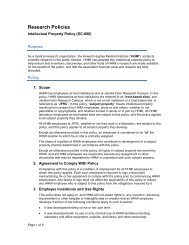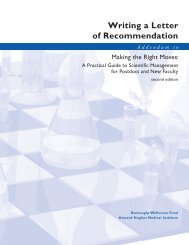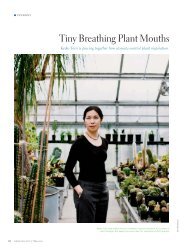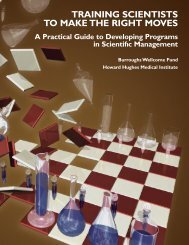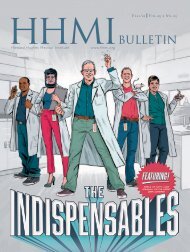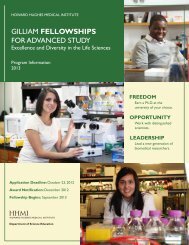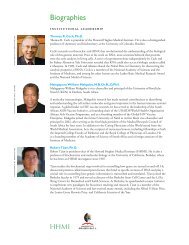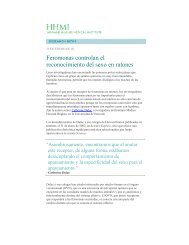Download PDF - Howard Hughes Medical Institute
Download PDF - Howard Hughes Medical Institute
Download PDF - Howard Hughes Medical Institute
Create successful ePaper yourself
Turn your PDF publications into a flip-book with our unique Google optimized e-Paper software.
High school teachers need the hands-on experience as well.<br />
In Louisiana, for example, many teachers are certified to teach<br />
high school biology or chemistry with just a smattering of college<br />
courses in the subject. They “have a working knowledge of the<br />
discipline, but they have no lab skills and no research experience<br />
as an undergraduate with respect to how science is really done,”<br />
says Ann Findley, a biology professor at the University of Louisiana<br />
at Monroe (ULM).<br />
To build their laboratory skills and confidence, each summer<br />
Findley and her colleagues invite eight Louisiana high school<br />
teachers and up to 60 of their students for an HHMI-sponsored<br />
month-long summer science workshop. The teachers and<br />
students work together through four successive one-week investigations,<br />
each in a different field of biology. “You might be tagging<br />
DNA with fluorescent dyes this week, and next week you may be<br />
out seining in the bayou to get the biomass of life in an aquatic<br />
environment,” says Brenda Grover, science chair at Richwood<br />
High School in Monroe and a workshop veteran. “Then you<br />
might move to geography, looking at satellite views of our area.”<br />
Teachers learn best how to lead inquiry-based lessons by<br />
working through them, according to research on professional<br />
development. Findley and her colleagues advise teachers privately<br />
about how to turn workshop exercises into lessons that will benefit<br />
their students. They also challenge teachers to prepare supplies<br />
and solutions for an exercise and discuss how to troubleshoot it.<br />
During the school year, the ULM team lends financially<br />
strapped high schools trunks with PCR machines, microscopes,<br />
centrifuges, and other equipment and supplies. Findley and<br />
her students act as science ambassadors to the 20 participating<br />
schools, modeling a culture of science for teachers and their<br />
students. Undergraduate biology majors help less-experienced<br />
teachers run lab investigations. Findley and biology graduate<br />
STEM TEACHING 2.0<br />
Education researchers say they<br />
have enough data to know what makes for<br />
good professional development.<br />
• MODEL EFFECTIVE TEACHING<br />
• BE IN-DEPTH AND SUSTAINED<br />
• LET TEACHERS HELP TEACHERS<br />
• DEVELOP TEACHER LEADERS<br />
• GET SYSTEM SUPPORT<br />
• DON’T FORGET ESTABLISHED TEACHERS<br />
To learn a little more about each of these ideas, visit<br />
WWW.HHMI.ORG/BULLETIN/FEB2012.<br />
students assist with school science days, encourage kids to enter<br />
science fairs, and help students envision getting a science, technology,<br />
engineering, and mathematics (STEM) degree, even if<br />
no one in their family has gone to college.<br />
The ULM workshop “gets teachers excited about teaching science,”<br />
Grover says. Students, too. The program has trained more<br />
than 500 students since it launched in 2000. Ninety-five percent<br />
of them go to college, according to years of follow-up surveys, and<br />
many major in science—no small accomplishment in an area<br />
with many schools like Richwood High School, where fewer than<br />
half of the students’ parents attended college and about 90 percent<br />
of students qualify for a free or reduced-price lunch. “You<br />
look at the poverty rate, and the area surrounding the school, and<br />
there’s nothing in the community [for the kids] to look forward<br />
to,” Grover says. “So if you find something to light their fire, man<br />
you just want to keep that fire going.”<br />
PEER SUPPORT<br />
Peer coaching helps teachers shift their focus from what teachers<br />
are teaching to what students are learning. An HHMI-funded<br />
program run by Occidental College in Los Angeles uses peer<br />
coaching in a method called Lesson Study. The college runs<br />
summer workshops in biology, chemistry, and physics for middle<br />
and high school teachers in the area, and they employ two science<br />
educators who visit schools and coach teachers throughout<br />
the school year.<br />
Robert de Groot is one of those science educators. He supervises<br />
Lesson Study at Jerry D. Holland Middle School in Baldwin<br />
Park, California, where six science teachers take turns teaching<br />
one of three inquiry-based science lessons. While one teaches,<br />
the other teachers and de Groot observe the students’ reactions.<br />
They note how well kids follow lab procedures, collect<br />
and report data, grasp scientific concepts, and use scientific<br />
vocabulary. Afterward, the teachers meet, discuss how the lesson<br />
can be improved, and offer tips to their colleague. Then<br />
the teachers switch roles; another teacher in the group teaches<br />
the revised lesson, and his or her classroom becomes the teaching<br />
laboratory.<br />
Chris Craney, a professor of chemistry at Occidental who<br />
supervises their science outreach program, reported in the Journal<br />
of Chemical Education in 1996 that the program increases student<br />
interest in science as well as chemistry and biology teachers’<br />
knowledge of scientific topics. And inquiry-based laboratories<br />
taught by the newly trained teachers significantly improved students’<br />
understanding of chemistry, biology, and physics concepts,<br />
according to the Occidental team’s unpublished assessments of<br />
3,000 students before and after the labs.<br />
Although Lesson Study keeps the focus on student learning,<br />
where it belongs, it’s expensive because substitutes must cover for<br />
the teachers who are observing, says Roehrig. As co-director of<br />
Minnesota’s Math and Science Teacher Partnership, a statewide<br />
professional development program for K–12 science and math<br />
teachers, Roehrig instead fosters what educators call “professional<br />
learning communities.” Science and math teachers are allowed<br />
paid time to meet at the school after hours to discuss what worked<br />
in the classroom and how they can improve next time.<br />
28 HHMI BULLETIN | February 2o12




